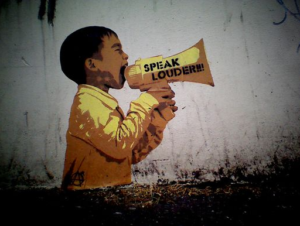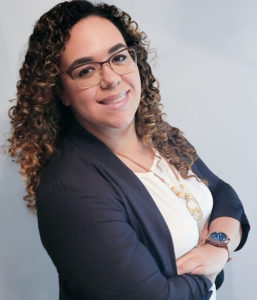
08 Dec Let’s Get Loud: Taking Off the Cloak of Invisibility
Oh, no! It happened again.
A client insulted you. They had a non-native, non-translator correct your work and asked for a refund. They asked you to volunteer to interpret out of the goodness of your heart. Maybe it wasn’t intentional, or maybe it was. Perhaps it was out of sheer ignorance of all that goes into your craft. Whatever the case may be, you’re furious. So, there you are, frustrated and fuming mad. You’re enraged, and you must get it off your chest. That’s when you log onto Facebook and search for your favorite translator/interpreter group, which is filled with colleagues who will understand every ounce of your frustration. You post a rant, get your therapy, and move on to the next adventure.
Think about how many times you have taken to social media to vent about the general lack of understanding about our profession. Have you ever written a post to share your frustration? Do you find yourself agreeing with these types of posts? I know that I have. I have seen countless posts from language professionals sharing their awful experiences and complaining about the rampant ignorance surrounding language professionals’ work.
Is there something else we can do besides cathartic venting to our colleagues in person and on social media?
My answer is a resounding yes. Yes, there is. In the words of J.Lo, “Let’s get loud!”
Oh, sure, we’ve all heard it before: one of the hallmark traits of a good translator/interpreter is the element of invisibility. And it seems that we’ve really taken that to heart and applied it to all parts of our professional life. Yet we can no longer afford – in all senses of the word – to be invisible. This cloak of invisibility we wear as a badge of honor may very well be costing us.
 Although I understand that the primary purpose of our work is to be invisible, that only applies to the act of interpreting and translating itself. As professionals, we cannot be invisible. We must be loud and vocal and be noticed because we are present. We are working, and our job is vital. Without us, there is no global communication. Without us, there is no justice for the non-English speakers.
Although I understand that the primary purpose of our work is to be invisible, that only applies to the act of interpreting and translating itself. As professionals, we cannot be invisible. We must be loud and vocal and be noticed because we are present. We are working, and our job is vital. Without us, there is no global communication. Without us, there is no justice for the non-English speakers.
I have seen a myriad of announcements for workshops and training by language professionals for language professionals. While continuing education is crucial to stay up to date in our practices and a requirement to hold some professional certifications, we can target new audiences. I have rarely seen an announcement for training aimed at other professionals who work with translators and interpreters, such as lawyers and law-enforcement officers. NAJIT has some excellent position papers, and there are a few articles on the internet, but besides that, there is not much out there.
If we want people to know something, we can make sure they do by teaching them. How about adding our clients (or potential clients) to our educational efforts? We can begin by reaching out to local courts, bar associations, law schools, professional associations, etc. We can work with them to develop and offer training on how to work with us, teach them that our profession has specific standards, and why our work matters. The more people know and understand our work, the better our working conditions will get.
In my experience, clients are more open to listening and taking your suggestions if they understand the reason behind them. Legal professionals almost always need a why for everything. I have been testing this for a few years now. I have noticed that if I request that attorneys share case details, documents, and information, my requests often go ignored unless I explain how sharing this information will benefit everyone. I have frequently found that I need only explain this once. After this, those same attorneys will come to me and share the information without me having to ask. Together, we can work to make this the rule and not the exception. Together, we can get loud. Together, we can finally make ourselves visible.
 Dennise A. Serrano was born and raised in a Spanish-speaking household in Puerto Rico. She was the only English-speaking member of her family, and the struggles her family members faced because of the language motivated her to become a professional translator and interpreter. She obtained a Bachelor’s Degree in Pre-Translation and a Master’s in Translation from the University of Puerto Rico. She currently works as a Language Specialist for the U.S. Attorney’s Office. She recently passed the oral portion of the Federal Court Interpreter Certification Examination. Contact her at dennise.serrano@gmail.com.
Dennise A. Serrano was born and raised in a Spanish-speaking household in Puerto Rico. She was the only English-speaking member of her family, and the struggles her family members faced because of the language motivated her to become a professional translator and interpreter. She obtained a Bachelor’s Degree in Pre-Translation and a Master’s in Translation from the University of Puerto Rico. She currently works as a Language Specialist for the U.S. Attorney’s Office. She recently passed the oral portion of the Federal Court Interpreter Certification Examination. Contact her at dennise.serrano@gmail.com.
Main photo (cropped) taken from “Aprende cómo vender más venciendo la timidez” by Mariano Cabrera L. at MARIANOCABRERA.com, under the CC BY-NC 4.0 license. Body photo “Make some noise # streetart in Bristol wheatpaste” by Earthlad at moblog, under the CC BY-SA 2.0 license.

Great points! I think there should be a required course in law school for how to work with an interpreter. How do we get that to happen?
I think maybe talking to the Bar Association may be a good first step.
Maybe establishing a working relationship with bar associations can be a good first step.
Maybe we should stop seeing ourselves as invisible.
A change in our own perspective may change the way others see us.
Thanks for sharing your story, and I believe venting is good but it must be followed by a plan or action to obtain a different outcome the next time, and that cannot be done in a group chat.
This is a more intimate conversation with peers and with all the context needed to assess what happened and why we are so mad after all.
By the way, congratulations on passing the oral portion of the Federal Court Interpreter Certification Examination. It is a great asset!
If you ever want to network, here is my email address: catalina@magnavoceie.com
Be well!
Catalina
Thank you!
I agree, let’s put words into action.
Wow! I totally agree, and I choose to believe that the professional associations of attorneys, judges, investigators, LEOs, court CEOs, etc would welcome new workshops that would help enlighten them as to what we do and why we do it (especially if they confer CEUs!) I agree we should reach out to them and offer workshops for their members! I’m very fortunate to work with judges that have always been receptive to suggestions or needs of the interpreter for improving service to our clients, but we know that’s not the case everywhere. There really is a lack of understanding of what we do, so we can give them the benefit of the doubt (no malice aforethought from them, hopefully!) but round out their knowledge with some history and training. Very good post, Denise, thank you.
Congratulations on your very well presented guest blog, Dennise! I hope you will keep contributing.
Thank you, Janis!
I have made this issue my war banner in 2022, and I am not about to stop doing it. But, we do need more translators/interpreters to speak up and to assert themselves as actual professionals, not just accessories to other professions, if we want others outside the industry to hear us.